What most people and business people realise is that their web site is one of their biggest investments they can make for themselves and for their business. And yet most folk have the idea that appoint a web designer and the site will magically appear, no effort on their part required.Regrettably it’s not that easy and straightforward. In fact, the more effort the client puts into their website the more amazing the outcome.
No idea what that means? Here are some points to consider when thinking about a new website for yourself or your business.
1) The importance of your Homepage
Of course your home page is all about the shop window of your online existence. It’s where visitors land to explore the rest of your site. Sure. But it’s much more than that. Your Homepage has to deliver on your promise. And what might that promise be? The promise is all about the reason for why you want visitors to come to the site and delivering on that.
Remember that the basic idea for your website is for your visitors. It’s not about you. It’s all abut them. What do they want to find, read about, view, learn and more. This means that your promise that you offer on your site has to be something your visitors want to get.
Say your website is about your business and you are in the business of being a personal coach. Your visitor wants to know what is in it for them. They don’t want to hear about you, but more what you can do for them. What’s the bottom line for the visitor? How do they benefit when they visit your site.
2) Knowing what you want to achieve with your website
You have been told that you need to be online. You have to have a website. That’s actually not a good enough reason. If you approach your website from that point of you, you might as well give up before you start.
Decide what you need your website to do for you. Is it more customers? Do you want to get a big subscriber base so that you can sell digital products to them? Do you want to promote courses, coaching sessions, decorating services, increase your client base and more. What is the purpose of your website? And just being online is not a good enough purpose.
There are always two points to this purpose determination. Want to sell something? How are you going to achieve that. So the How and What go hand in hand. Having a proper answer for this is hugely important to the success of your new site.
3) Who is your website going to be for
Would you start a bakery for gluten free cookies if you didn’t know there was an audience for this? Would you not identify exactly who the people are who would want to buy gluten free cookies from you?
What about a service such as motor car mechanic. Would you market your service to somebody who has no car? Of course not. But yet most websites are put up without one thought as to who the target audience might be or what their interests, tastes, preferences etc could be. How often have you heard, I’m selling my product or service to everybody. Everybody needs me. Mmh. Maybe not. Find out who your target audience really is. It’s worth it.
4) A call to action
Don’t forget that strong call to action. Your business of selling a consultancy service has a website. Are you asking your visitors to call you to discuss their requirements? Where is the phone number, the form for email enquiries, the physical address or the Skype ID? Are you really seriously asking them to contact you?
5) General Contact points
How easy is it to find your contact details? Is there a phone number visible? An email hot link, a form to complete, an address to check? How easily can your website visitor get hold of you and are you encouraging them to do just that?
6) Easy Navigation
As the web matures there are certain conventions that are settling in to become the de facto way to do things. One of these is the navigation. It’s no longer practical to place the main navigation menu items anywhere else but above the content of the site. Don’t bother with side navigation bars for instance. You don’t want to confuse your visitor. She is used to the menu bar being in one place by now. Don’t lose her because you want to be ‘creative’ in your design.
7) Testimonials
Let people know that you have been praised for your services or products. Encourage your customers or clients to provide you with testimonials. It’s something that is read and appreciated by your visitors. In an age of constant fraud and corruption, people want to know whether you are trustworthy. Show them.
8) Sharing
It’s social media time. Make it easy for your visitors to share the page they are reading. Encourage them to share by placing the share menu bar in the most accessible and easily seen place. You might not be a big Twitter or Facebook user, but your readers could be. And not only does it mean you have more visitors if you site is promoted on Twitter but you also get Google love for the Tweet.
9) Make it visual
If you are lucky to operate in an industry where there is a lot of visual material, this is an easy point to follow. Designers, photographers, architects etc are lucky in that their work is so visual. Which means their websites can be loaded with gorgeous visual stuff. That doesn’t mean that you can’t find some clever images for your plumbing business, your relationship coaching site, your manufacturing focused business.
10) You get what you pay for
Don’t go cheap and nasty. It’s always surprising that clients will spend a fair amount on business cards, or brochures, even the odd advert in the newspaper. But the budget for the website is $300. And for that budget they want the world. After all web design is so easy and requires no work at all. On the contrary. A web site is a combination of good design, clever coding and a fair amount of effort and know-how. Be fair. Pay a good fee. You will be rewarded with something special rather than with a rubbish thing you are too embarrassed to tell anybody about.
So launching yourself into a web site project? Get yourself a designer who knows how to do web design. That means avoid the cousin three times removed who is ‘creative’ or so your aunt says. Or the print designer who has no idea how the web works. Or the blogger who has set up a few blogs and now knows all about web design. But over and above a good web designer, remember the above pointers and your new web site will be a winner.







